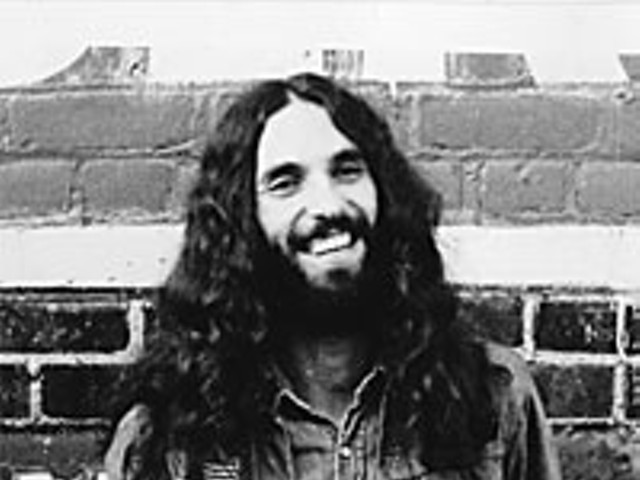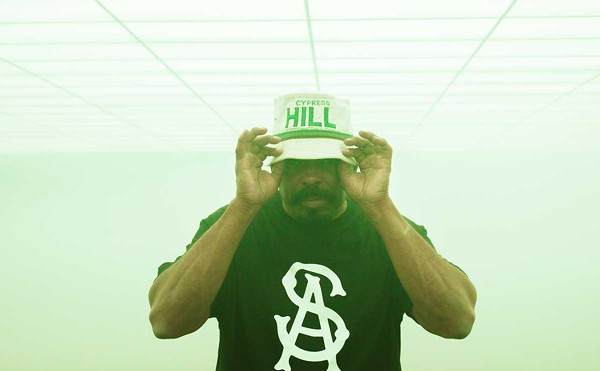Timely coincidence that Peter Oundjian's initials can either stand for his name or for pissed off. Serendipitous, really. He's a nice guy, but the Detroit Symphony Orchestra's principal guest conductor is also serving as the artistic director of a festival partially designed to celebrate music's ability to agitate.
The festival, called 8 Days in June, is a first for a Motor City fest: a mash-up of orchestra, jazz and hip-hop that's centered around the notion of conflict. Each day explores music's place in a particular theme. Shock. Rise Above. Survive. Unravel. Instigate. Rebuild. Fight Back. Confront. It's a week and a day focused on the jazz roots of Congo Square, the only area in New Orleans where African slaves were allowed to celebrate their cultural heritage. Stravinsky's musical responses to World War I. Public Enemy founder/leader Chuck D's 20-year aural assault on the "isms" that made America. And more, so much more.
An artists' festival? Maybe. An experiment? In more ways than one. A landmark for the Detroit Symphony Orchestra? Undeniably. And it stands to attract crowds well beyond the DSO's usual boundaries; in other words, you've never seen nor heard the Detroit Symphony like this. Oundjian took time to talk about the DSO and the notion of conflict music, and the beautiful movements that have been spurred by this beautiful noise.
Metro Times: You have Wynton Marsalis and Chuck D of Public Enemy in the same fest. Interestingly, Marsalis has been a critic of hip hop. [Note: The DSO announced on Friday that Chuck D's Monday, June 25, appearance has been cancelled via a call from his management. The Monday 10 p.m. Late Night Poetry Slam with host Kalimah Johnson is to go on as planned.]
Peter Oundjian: Well, they're not on the same day. Anyway, when you're talking about conflict, it's healthy. I think it's really important to make it as fluid as possible in that way. Stravinsky also spoke very badly of Beethoven. That's the way it is in the creative world.
MT: If I'm the festivalgoer who's not familiar with the ties that bind classical, jazz and hip hop, what can I expect from the 8 Days in June festival?
Oundjian: You should feel really included. You're gonna feel welcomed, and you're gonna feel that you're being communicated with. You're experiencing kind of a first, in terms of presentation. It'll be very difficult to get bored.
MT: How did the idea for the festival come about?
Oundjian: About a year ago, the executive director of the Detroit Symphony Orchestra, Ann Parsons, started to talk to me about Tom Allen, who is the radio host on "Classical CBC" in the morning. She said, "I would really like to start a festival, and I wonder if you and Tom wouldn't be able to create something for us?"
I already knew Tom ... we both live a lot of the time in Toronto. He and I came up with several ideas, and this particular one was one that I had been thinking about for a long time, the idea that a lot of the most important creativity comes out of conflict. We started to develop programming ideas and guest artists. The presentation format is intended to be different from a normal classical concert, where everyone sits down, and then the conductor comes on, everyone claps, and then there's music, an intermission, a second round, and you leave. We intended it to be much more communicative and integrated with the listener. So we've tried to create a kind of accessibility for people who might think about going to a classical concert, but they think it's too formal.
MT: It seems like the festival, with its eclectic makeup, is designed to do more than just attract new people.
Oundjian: Well, it is a little bit more than that. It's to create a whole new energy around the idea of what happens at the Detroit Symphony, and make people feel that music is music. I was a kid when the Beatles came along. There was suddenly this divide between the world of amplified music, which was rock or pop back then, and classical. Classical felt more and more like a dull, old-fashioned pastime. I was right in the middle, because I was being trained as a classical musician. But I was a fanatical rock music lover. I never understood why people say, "I can't stand classical music, but I love listening to Emerson, Lake and Palmer," who often were quoting classical pieces in their own songs. I realized that classical music, in the way it was being presented, was at fault.
Now, in the age of the iPod, people can walk around with hundreds of hours of music. People are open, because they can hold it all. It's a very ripe moment for people to say it's all great music. If you love System of a Down, you'll probably really dig Shostakovich's 11th Symphony. It's about bringing a new audience, but it's also about making a statement that music is a part of all of our lives. It's important for society, and it's important for the individual. It's not an intellectual pastime, and shouldn't be thought of that way.
MT: You talked about creativity emerging through conflict. How did that play out in the process of developing the theme for each day of the festival?
Oundjian: We were looking at different angles. First, I wanted to look at the beginning of three centuries. The beginning of the 1800s, we had the Napoleonic Wars, and that had a huge effect on the music of Beethoven and many other composers. We had the beginning of the 1900s, which is the Russian Revolution and the First World War. That also had an effect on classical music. For example, Stravinsky's "Rite of Spring" was written right before the war. There's a demonic intensity to that music that's just so fantastic to listen to. And then, 9/11, obviously ...
Gradually, we started to look into other aspects. For example, the Congo Square, which gets into jazz, with Wynton Marsalis, who actually went to school with me at the Juilliard School in New York. And then there's the Headcase, with Brett Dietz, who had a stroke at the age of 27. We looked at different situations where this theme seemed to be resonant.
8 Days in June is scheduled for Thursday, June 21, through Thursday, June 28, at the Max M. Fisher Music Center, 3711Woodward, Detroit. For information, call 313-576-5100, or go to 8daysinjune.com.
Khary Kimani Turner is a freelance writer. Send comments to [email protected]





